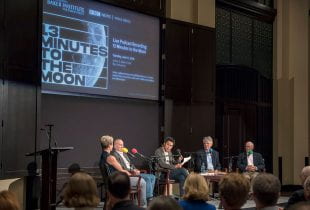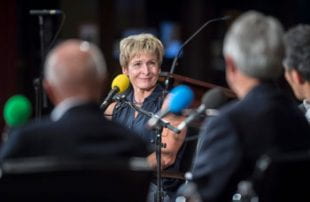When the Apollo 11 lunar module descended to the moon on July 20, 1969, Gerald Griffin, former director of NASA’s Johnson Space Center and then a flight controller, was tensely yet confidently monitoring the spacecraft’s nail-biting progress from Mission Control in Houston.

The Baker Institute’s stately Doré Commons served as the backdrop for the recording of the BBC’s “13 Minutes to the Moon” podcast. Photos by Tommy Lavergne, video by Brandon Martin
The landing was one of the nerve-wracking moments of Apollo 11, he recalled at a June 11 taping of the BBC’s podcast “13 Minutes to the Moon” at Rice’s Baker Institute for Public Policy. Launched on May 13, the 12-part series covers the Apollo program through the final dramatic 13-minute descent of the Apollo 11 mission, when everything came close to going badly wrong. Communication was breaking down, technology was failing and, most critically, fuel was running out.
“We made a 60-second call (to abort landing), and then we made a 30-second and a 20-second (call) and (were) about to make a 10-second call when he (commander Neil Armstrong) touched down (on the lunar surface) and shut the engine down,” Griffin said. “We went back later and calculated that he had about 17 seconds of fuel remaining. That was by far the closest we got in any of the landings to the moon.
“I think Neil knew better than we did because we couldn’t see anything. He could see. He knew what he was doing.”
Apollo 11 launched from Florida’s Cape Kennedy (now Cape Canaveral) on July 16, 1969, with Armstrong, command module pilot Michael Collins and lunar module pilot Edwin “Buzz” Aldrin on board. An estimated 650 million people watched Armstrong take “one small step for a man, one giant leap for mankind.”
Marking the 50th anniversary of this extraordinary moment in history and hosted by the BBC’s Kevin Fong, “13 Minutes to the Moon” celebrates the people and technology that took humanity to the moon. The episode recorded in front of a live audience in the Baker Institute’s Doré Commons, which will constitute the July 20 series finale, features members of the original Apollo team looking back at the major events of Project Apollo. More than five decades after President John F. Kennedy gave his famous “we choose to go to the moon” speech at Rice Stadium, the panelists also reflected on the prospects for a return to human space exploration.

Former NASA chief astronaut and Rice alumna Peggy Whitson accrued a total of 665 days in space over the course of her career, making her NASA’s most experienced astronaut and the woman with the most time in space.
The panelists included John Aaron, former flight controller in the Apollo program; Walter Cunningham, former Apollo astronaut; and former NASA chief astronaut and Rice alumna Peggy Whitson ’86, who holds the U.S. record for most time in space. Neal Lane, senior fellow in science and technology policy at the Baker Institute and a former National Science Foundation director and provost at Rice, gave welcoming remarks.
“My parents let us stay up late (for the landing). That was a big deal,” recalled Whitson, who earned her Ph.D. in biochemistry at Rice and serves as an adjunct associate professor of biosciences. “I remember being in my pajamas and watching on a really old, cruddy black-and-white (TV). I don’t think I understood as a 9-year-old the total significance of the event, but it certainly made an impression on me, and it’s one that lasted and one that made me want to become an astronaut.”
For an overview of Rice’s historic relationship with NASA and the space program, see the Rice News article, “We choose to go to the moon.”
The podcast is available at https://www.bbc.co.uk/programmes/w13xttx2.


